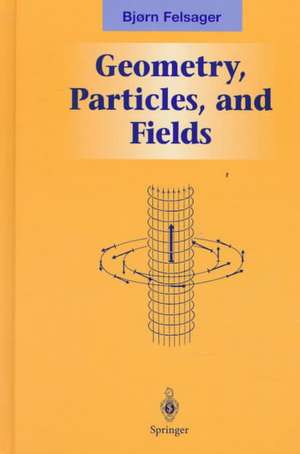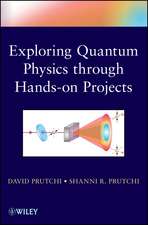Geometry, Particles, and Fields: Graduate Texts in Contemporary Physics
Autor Bjoern Felsageren Limba Engleză Hardback – 9 ian 1998
| Toate formatele și edițiile | Preț | Express |
|---|---|---|
| Paperback (1) | 603.07 lei 6-8 săpt. | |
| Springer – 17 oct 2012 | 603.07 lei 6-8 săpt. | |
| Hardback (1) | 805.29 lei 6-8 săpt. | |
| Springer – 9 ian 1998 | 805.29 lei 6-8 săpt. |
Din seria Graduate Texts in Contemporary Physics
- 17%
 Preț: 395.10 lei
Preț: 395.10 lei - 18%
 Preț: 744.22 lei
Preț: 744.22 lei - 15%
 Preț: 588.04 lei
Preț: 588.04 lei -
 Preț: 393.52 lei
Preț: 393.52 lei - 15%
 Preț: 593.91 lei
Preț: 593.91 lei -
 Preț: 397.01 lei
Preț: 397.01 lei - 18%
 Preț: 809.07 lei
Preț: 809.07 lei -
 Preț: 394.71 lei
Preț: 394.71 lei -
 Preț: 399.88 lei
Preț: 399.88 lei - 15%
 Preț: 651.67 lei
Preț: 651.67 lei - 15%
 Preț: 609.14 lei
Preț: 609.14 lei - 15%
 Preț: 599.14 lei
Preț: 599.14 lei - 18%
 Preț: 1028.15 lei
Preț: 1028.15 lei - 15%
 Preț: 596.36 lei
Preț: 596.36 lei -
 Preț: 388.90 lei
Preț: 388.90 lei - 15%
 Preț: 538.61 lei
Preț: 538.61 lei -
 Preț: 402.56 lei
Preț: 402.56 lei - 15%
 Preț: 542.04 lei
Preț: 542.04 lei - 15%
 Preț: 591.14 lei
Preț: 591.14 lei -
 Preț: 395.47 lei
Preț: 395.47 lei -
 Preț: 385.62 lei
Preț: 385.62 lei -
 Preț: 383.33 lei
Preț: 383.33 lei -
 Preț: 394.29 lei
Preț: 394.29 lei -
 Preț: 382.36 lei
Preț: 382.36 lei -
 Preț: 400.47 lei
Preț: 400.47 lei -
 Preț: 385.47 lei
Preț: 385.47 lei
Preț: 805.29 lei
Preț vechi: 982.05 lei
-18% Nou
Puncte Express: 1208
Preț estimativ în valută:
154.11€ • 167.34$ • 129.45£
154.11€ • 167.34$ • 129.45£
Carte tipărită la comandă
Livrare economică 22 aprilie-06 mai
Preluare comenzi: 021 569.72.76
Specificații
ISBN-13: 9780387982670
ISBN-10: 0387982671
Pagini: 672
Ilustrații: X, 672 p.
Dimensiuni: 155 x 235 x 40 mm
Greutate: 1.11 kg
Ediția:1st ed. 1983. Corr. reprint 1998
Editura: Springer
Colecția Springer
Seria Graduate Texts in Contemporary Physics
Locul publicării:New York, NY, United States
ISBN-10: 0387982671
Pagini: 672
Ilustrații: X, 672 p.
Dimensiuni: 155 x 235 x 40 mm
Greutate: 1.11 kg
Ediția:1st ed. 1983. Corr. reprint 1998
Editura: Springer
Colecția Springer
Seria Graduate Texts in Contemporary Physics
Locul publicării:New York, NY, United States
Public țintă
GraduateCuprins
I. Basic Properties of Particles and Fields.- 1. Electromagnetism.- 2. Interaction of Fields and Particles.- 3. Dynamics of Classical Fields.- 4. Solitons.- 5. Path Integrals and Instantons.- II. Basic Principles and Applications of Differential Geometry.- 6. Differentiable Manifolds?Tensor Analysis.- 7. Differential Forms and the Exterior Calculus.- 8. Integral Calculus on Manifolds.- 9. Dirac Monopoles.- 10. Smooth Maps?Winding Numbers.- 11. Symmetries and Conservation Laws.
Recenzii
FROM THE REVIEWS:
MATHEMATICAL REVIEWS
"It is particularly well-suited as an introductory text, since the author takes great care to anticipate points that may cause confusion…The author does a good job of focusing on the fundamentals…[The first] part of the book works as either a self-contained introduction to classical field theory, or as a complement to a good text on classical electrodynamics…[The second] part of the book is very clear and well planned…works as a self-contained introduction to manifolds and differential forms, or, even better, as a compliment to a concise mathematics text.”
PHYSICS TODAY
"The present volume is a welcome edition to the growing number of books that develop geometrical language and use it to describe new developments in particle physics ... It provides clear treatment that is accessible to graduate students with a knowledge of advanced calculus and of classical physics.... The second half of the book deals with the principles ofdifferential geometry and its applications, with a mathematical machinery of very wide range. Here clear line drawings and illustrations supplement the multitude of mathematical definitions. This section, in its clarity and pedagogy, is reminiscent of Gravitation by Charles Misner, Kip Thorne and John Wheeler.... Felsager gives a very clear presentation of the use of geometric methods in particle physics.... For those who have resisted learning this new language, his book provides a very good introduction as well as physical motivation. The inclusion of numerous exercises, worked out, renders the book useful for independent study also. I hope this book will be followed by others from authors with equal flair to provide a readable excursion into the next step."
MATHEMATICAL REVIEWS
"It is particularly well-suited as an introductory text, since the author takes great care to anticipate points that may cause confusion…The author does a good job of focusing on the fundamentals…[The first] part of the book works as either a self-contained introduction to classical field theory, or as a complement to a good text on classical electrodynamics…[The second] part of the book is very clear and well planned…works as a self-contained introduction to manifolds and differential forms, or, even better, as a compliment to a concise mathematics text.”
PHYSICS TODAY
"The present volume is a welcome edition to the growing number of books that develop geometrical language and use it to describe new developments in particle physics ... It provides clear treatment that is accessible to graduate students with a knowledge of advanced calculus and of classical physics.... The second half of the book deals with the principles ofdifferential geometry and its applications, with a mathematical machinery of very wide range. Here clear line drawings and illustrations supplement the multitude of mathematical definitions. This section, in its clarity and pedagogy, is reminiscent of Gravitation by Charles Misner, Kip Thorne and John Wheeler.... Felsager gives a very clear presentation of the use of geometric methods in particle physics.... For those who have resisted learning this new language, his book provides a very good introduction as well as physical motivation. The inclusion of numerous exercises, worked out, renders the book useful for independent study also. I hope this book will be followed by others from authors with equal flair to provide a readable excursion into the next step."
Caracteristici
Provides a clear treatment accessible to graduate students. Develops geometrical language that is the used to describe recent developments in particle physics. Gives a clear presentation on the use of geometric methods. A good introduction to quantum field theory, including physical motivation and exercises. Numerous worked out examples makes the book ideal for independent study.













